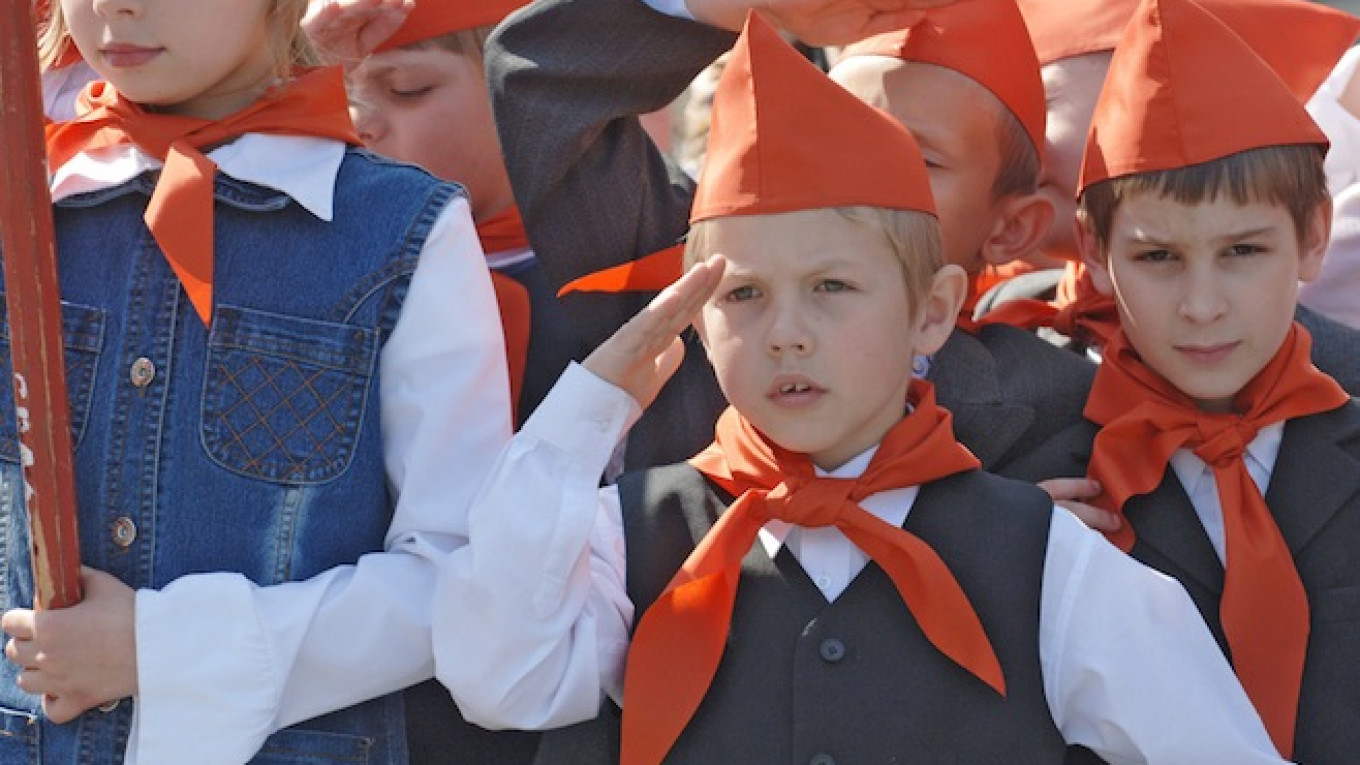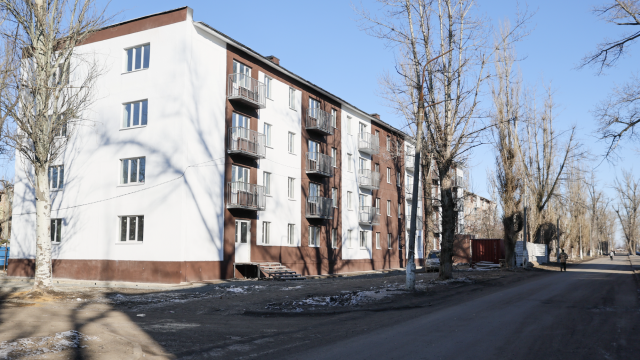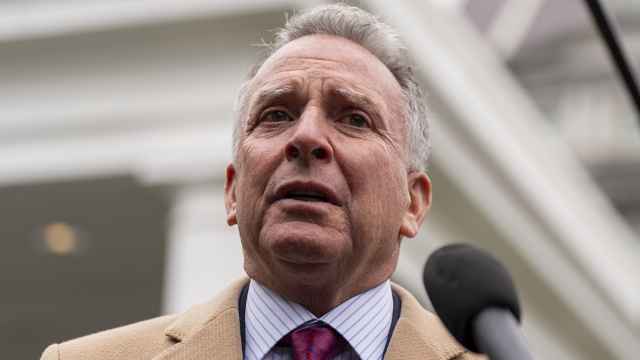President Vladimir Putin has ordered the creation of a schoolchildren's movement aimed at promoting national values and apparently modeled on the Soviet Union's Young Pioneers organization.
The Russian Schoolchildren's Movement is being established to “perfect state policy in the area of educating the young generation, [and] to support the forming of personalities on the basis of the value system inherent to Russian society,” Putin said in a decree signed Thursday and posted on the government's official document website.
The date when the decree was signed and published, Oct. 29, is the anniversary of the founding in 1918 of the Soviet Union's Young Communist League, or Komsomol: a group that comprised high-schoolers, college students and young professionals.
The potential symbolism of the timing prompted many in Russia to speculate that the new schoolchildren's movement would resemble yet another of the Soviet Union's youth organizations, intended for yet younger citizens: the Young Pioneers.
“On Komsomol's birthday, Putin signed a decree on creating new Pioneers,” the Komsomolskaya Pravda daily said in a headline on its website Thursday.
The newspaper went on to clarify, however, that the new movement was not an attempt to recreate the pioneers, because unlike its Soviet-era predecessor, the new organization would be free from Communist or any other ideology.
The shape and scope of the new movement remained unclear. Education Ministry officials appeared unfamiliar with Putin's plans, while a social affairs official in Russia's Cabinet said the new movement was “exclusively the presidential administration's” idea, RBC news agency reported.
Given Russia's economic turndown and the nation's tight budget, “everything will boil down to an allocation of office space,” another unidentified official was quoted by RBC as saying.
But others argued the new group could fill a niche that had been left vacant for decades since the 1991 Soviet collapse.
“I liked being a pioneer: One developed responsibility toward an organization, and patriotism — my friends and I didn't just hang out on the street,” cosmonaut Alexander Volkov was quoted by Komsomolskaya Pravda as saying. “All of this is, of course, needed now as well.”
In a country that saw an upsurge in crime, drug use and, more recently, radical Islamist movements amid the easing of government restrictions that followed the Soviet collapse, supporters of the new movement see it as a way of providing a purpose for young Russians.
“Children like all this: badges, trouser piping, they like to be somebody,” the editor-in-chief of Moscow's Govorit Moskva radio, Sergei Dorenko, was quoted by Komsomolskaya Pravda as saying. “So it's not a bad thing, if one doesn't go overboard and doesn't teach early cynicism to children. This, by the way, was what ruined the pioneers' organization.”
While several modern Pioneers organizations exist, mostly run by the Communist party, they do not operate at a national level like the new Russian Schoolchildren's Movement.
While Putin's decree did not specify the values that the new movement was supposed to develop in children, the Russian leader has been increasingly calling for patriotic education recently, as Moscow's relations with the West have grown fetid over the crises in Ukraine and Syria.
Moscow's official rhetoric accuses Western governments of seeking to destroy Russia, while criticism of Kremlin policies is frequently denounced as a sign of belonging to the “fifth column” or subscribing to “extremist” views.
The Education Ministry has proposed legal amendments that would ban teachers from promoting “extremist” ideas at schools, the head of the ministry's childhood education department, Alexander Stradze, was quoted Thursday as saying by Interfax news agency.
“Teachers' activities should be aimed at forming in students [an adherence to] the system of values and standards of behavior that have historically been established in Russia, and the understanding of the need to reject the ideas of terrorism and extremism,” Stradze was cited by Interfax as saying.
Putin's decree named the federal agency for youth affairs as the founder of the schoolchildren's movement.
The agency's chief, Sergei Pospelov, said the president's decree was a response to an appeal by faction leaders in the State Duma, the lower house of parliament, RBC reported.
“Proposals to create such an organization have also been discussed by educational institutions, public associations, and experts on education work among children and youth,” Pospelov was quoted as saying.
Pospelov's agency has also been asking the government for more money to fund pro-Kremlin summer camps for children, RBC reported.
The State Duma's sports and youth affairs committee has called for allocating an additional 1.2 billion rubles ($18.7 million) to the federal agency for youth affairs in next year's federal budget, up from the total of 879 million rubles that are currently envisaged for the agency, RBC reported.
The Soviet Union had three massive youth organizations: Oktyabryata for young children, starting with elementary school students, Pioneers for middle schoolers, and Komsomol, into which applicants were admitted starting from high-school age. Komsomol membership was in most cases obligatory to gain admission to elite colleges and universities.
In another recent reintroduction of Soviet-era practices, Putin signed a law earlier this month that re-establishes physical training standards known in Russia by its acronym GTO, which stands for “Ready for Labor and Defense.”
A Message from The Moscow Times:
Dear readers,
We are facing unprecedented challenges. Russia's Prosecutor General's Office has designated The Moscow Times as an "undesirable" organization, criminalizing our work and putting our staff at risk of prosecution. This follows our earlier unjust labeling as a "foreign agent."
These actions are direct attempts to silence independent journalism in Russia. The authorities claim our work "discredits the decisions of the Russian leadership." We see things differently: we strive to provide accurate, unbiased reporting on Russia.
We, the journalists of The Moscow Times, refuse to be silenced. But to continue our work, we need your help.
Your support, no matter how small, makes a world of difference. If you can, please support us monthly starting from just $2. It's quick to set up, and every contribution makes a significant impact.
By supporting The Moscow Times, you're defending open, independent journalism in the face of repression. Thank you for standing with us.
Remind me later.






